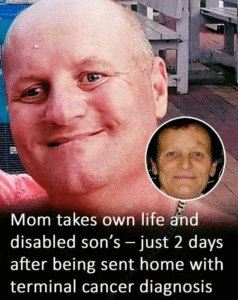Shirley Nunn’s death, along with that of her severely disabled son Steven, has sparked national outrage and sorrow, shedding light on the deep failures within the family care and support system. Shirley, 67, was a devoted mother and full-time caregiver to her son Steven, 50, who had been left with severe brain damage and physical disabilities following an accident at the age of 11. When her husband died in 2019, she became the sole person responsible for Steven’s care. Their deaths, found two years to the day after the loss of her husband, paint a tragic picture of desperation and isolation.
Shirley had recently been diagnosed with advanced cancer, including lung, brain, spine, and pelvic tumors. Her condition was terminal, and she was discharged from hospital into palliative care. As her health deteriorated, Shirley reportedly became increasingly anxious and distressed over what would happen to Steven once she was no longer able to care for him. Despite this, professionals did not fully grasp the seriousness of her mental state or the psychological burden she was carrying. She had expressed deep concerns to doctors and caregivers, but there was no cohesive response plan for Steven’s continued care.
On the day of their deaths, emergency services discovered both Shirley and Steven deceased in their home. Investigators believe Shirley gave Steven a fatal dose of medication before ending her own life. A Domestic Homicide Review later confirmed that Shirley had not acted out of malice but from fear and love, overwhelmed by the thought of leaving her son behind with no proper care or future. The review concluded that better support, mental health intervention, and planning could have prevented this tragedy.
Critics of the care system argue that Shirley’s death was not just a personal tragedy but a societal failure. There had been multiple opportunities to provide the family with more support—social services, mental health professionals, and healthcare workers had all been involved, yet none acted decisively. Her mental health was overlooked, and Steven’s dependency on her was not given the attention it urgently needed.
Shirley had been under significant emotional strain, and while her cancer was being treated, the looming issue of Steven’s care remained unresolved. The review highlighted how her increasing mental distress and feelings of hopelessness were visible but not addressed with the seriousness they required. No proper psychological support or crisis intervention was provided in the days leading up to their deaths.
Many are now calling for a complete overhaul in how terminally ill caregivers are treated, especially those responsible for adults with lifelong care needs. Suggestions include mandatory contingency planning for dependents, psychological counseling for caregivers receiving palliative care, and stronger coordination between agencies responsible for health and social services. Experts emphasize that caregivers like Shirley must not be left to suffer in silence or feel like their only option is a tragic one.
The case has also reignited debates about the role of informal caregivers in society. Shirley had essentially been functioning as a full-time, unpaid nurse for decades. Without proper state support, her health and well-being deteriorated under the weight of stress, grief, and anxiety. Her story is a clear indication that when caregivers are neglected, those they care for are also placed at risk.
The local council and healthcare providers issued statements expressing regret and promising to learn from the incident. But for many advocacy groups, apologies are not enough. They demand action—greater investment in home care services, routine welfare checks for family caregivers, and integrated health plans that address the needs of both caregiver and dependent.
What happened to Shirley and Steven Nunn was not inevitable. It was a preventable loss rooted in systemic neglect. It raises uncomfortable questions: how many other families are quietly struggling in similar conditions? How many other caregivers feel abandoned in their time of need? And what will be done now to ensure no other family is left so alone?
Shirley Nunn’s legacy must be one of reform. Her love for her son was unconditional, but love alone was not enough to protect them. Systems need to change. Services need to listen. And society must recognize and support the vital role of caregivers before more lives are lost to despair.


